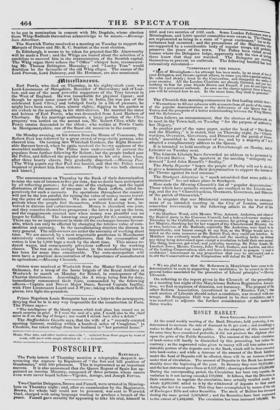The announcement on Thursday by the Bank of their determination
to raise the rate of interest to five per cent., has no doubt been anticipated by all reflecting persons ; for the state of the exchanges, and the rapid diminution of the amount of treasure in the Bank coffers, called im- peratively for such a measure. Its operations throughout the country will not be the less painful, for raising the value of money means lower- ing the price of commodities. We are now arrived at cam of those periods when the people feel themselves, without knowing how, in- volved in distress and embarrassment, Money is abundant one year, and they conceive themselves prosperous ; the screw is put on the next, and the engagements entered into when money was plentiful can no longer be fulfilled. The knowing ones prepare for the coining storm. There can be no improvement in trade till the exchanges become favour- able, which can only be effected by changing the relative value of corn- Modifies and currency. In the manufacturing districts the distress is very general. The mill-owners are under the necessity of working short time. We are assured, by a most respectable gentleman in Manchester extensively connected with manufactures, that the consumption of cotton is less by 5,000 bags a week by the short time. This means re- duced wages, and consequently privations suffered by the working classes. The run on the savings banks, in the manufacturing towns, has been for some time considerable. The corn-monopolists will soon have a practical demonstration of the importance of manufactures to agriculture.—Moraing Chronicle.


























 Previous page
Previous page